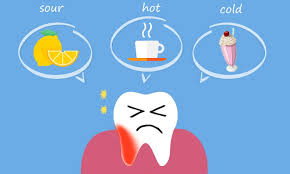Are you struggling with sensitive teeth–especially teeth that are sensitive to heat or cold? With so many of your favourite foods in one of those categories, temperature sensitivity can be a real problem. If you’ve been struggling with sensitive teeth, you shouldn’t simply dismiss the problem. Identifying the underlying issues that can be related to tooth sensitivity will help you prevent further damage to your teeth and gums.
What Heat or Cold Sensitivity Tells You
Sensitivity to heat or cold is normal for some people–and changing your toothpaste, avoiding highly acidic substances like marinara sauce, and brushing gently can all help alleviate the problem. In other cases, however, heat and cold sensitivity in your teeth can be warning signs of a more serious problem. Identifying it early will allow you to receive the treatment you need.
You have a cavity or abscess:Sudden sensitivity to heat or cold can be a sign that there’s a serious problem with your teeth. If the problem comes out of nowhere and seems to be getting worse, make sure you get to your dentist quickly.
You have a problem with an existing filling or crown: Fillings that have chipped or worn away or crowns that have leaks or cracks can cause an increase in heat or cold sensitivity in your teeth.
Gum recession has caused root exposure:Gum recession, whether caused by excessive brushing, by gum disease, or because of age, can lead to greater nerve exposure, which in turn makes the tooth extremely sensitive.
Your enamel is wearing down:This leaves your teeth more sensitive to both heat and cold.
When to See Your Dentist
Gradual onset of heat or cold sensitivity may go virtually ignored over time. As your symptoms increase, however, you may find yourself struggling to deal with the increased discomfort. Any time symptoms show up quickly, you should see your dentist as soon as possible to make sure that there’s not a bigger problem. If you’re noticing a gradual increase in normal tooth sensitivity, make sure to discuss it with your dentist at your next appointment.
If you need a dental check-up, whether to determine the root of tooth sensitivity or to help get your teeth in better shape, contact us. We’ll work with you to decrease that sensitivity so you can enjoy your favourite foods again.
